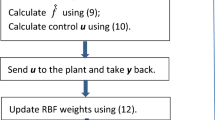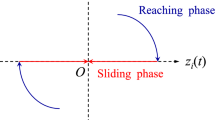Abstract
This paper presents the design of a new fault-tolerant control methodology based on a model-free neural technique. For an unknown nonlinear dynamical system, a recurrent neural network is proposed to design an on-line identifier to develop an adaptive mathematical model that captures the dynamics of the system using only available measurements of its state variables. Employing this neural model, the use of a discrete sliding mode controller is proposed, which is modified to adequately handle the presence of faults in the sensors and actuators, as well as disturbances and uncertainties that occur during the operation of the system. The effectiveness of the proposed control scheme is shown by means of simulation results for a three-phase induction motor. Most of the fault-tolerant controllers start from a nominal model of the system to be controlled, from that neural model methodologies are established that evaluate the behavior of the system with respect to a nominal model, originating a residue between such signals. This residue is analyzed using traditional techniques or artificial intelligence, for which the success of this type of methodology lies in how well the behavior of the system is captured in its mathematical model. Therefore, the main contribution of this methodology is that the proposed controller is model-free, the detection of the fault and the corresponding modification to the control is carried out directly from the measured data, nor does it require exact knowledge of the faults, their duration, or the time they occur, everything is computed implicitly through the neural network.
Supported by CONACYT Mexico, through Project PCC-202/319619.
Access this chapter
Tax calculation will be finalised at checkout
Purchases are for personal use only
Similar content being viewed by others
References
Hamayun, M.T., Edwards, C., Alwi, H.: Fault Tolerant Control Schemes Using Integral Sliding Modes. Studies in Systems, Decision and Control. Springer, Cham (2016). https://doi.org/10.1007/978-3-319-32238-4
Alwi, H., Edwards, C., Tan, C.P.: Fault Detection and Fault Tolerant Control Using Sliding Modes. Advances in Industrial Control Series. Springer, New York (2011). https://doi.org/10.1007/978-0-85729-650-4
Salgado, I., Ahmed, H., Camacho, O., Chairez, I.: Adaptive sliding-mode observer for second order discrete-time MIMO nonlinear systems based on recurrent neural-networks. Int. J. Mach. Learn. Cybern. 10(10), 2851–2866 (2019). https://doi.org/10.1007/s13042-018-00908-z
Yin, X., Jiang, Z., Pan, L.: Recurrent neural network based adaptive integral sliding mode power maximization control for wind power systems. Renew. Energy 145, 1149–1157 (2020). https://doi.org/10.1016/j.renene.2018.12.098
Zhang, H., Liu, Y., Wang, Y.: Observer-based finite-time adaptive fuzzy control for nontriangular nonlinear systems with full-state constraints. IEEE Trans. Cybernet. Early View (2020). https://doi.org/10.1109/TCYB.2020.2984791
Liang, H., Liu, G., Zhang, H., Huang, T.: Neural-network-based event-triggered adaptive control of nona ne nonlinear-multiagent systems-with dynamic uncertainties. IEEE Trans. Neural Netw. Learn. Syst. Early view (2020). https://doi.org/10.1109/TNNLS.2020.3003950
Zhang, H., Liu, Y., Dai, J., Wang, Y.: Command filter based adaptive fuzzy finite-time control for a class of uncertain nonlinear systems with hysteresis. IEEE Trans. Fuzzy Syst. Early view (2020). https://doi.org/10.1109/TFUZZ.2020.3003499
Du, P., Pan, Y., Li, H., Lam, H.: Nonsingular finite-time event-triggered fuzzy control for large-scale-nonlinear systems. Trans. Fuzzy Syst. Early view (2020). https://doi.org/10.1109/TFUZZ.2020.2992632
Yang, R., Zheng, W.X., Yu, Y.: Event-triggered sliding mode control of discrete-time two-dimensional systems in Roesser model. Automatica 114 (2020). https://doi.org/10.1016/j.automatica.2020.108813
Nguyen, V.T., Lin, C.Y., Su, S.F., Tran, Q.-V.: Adaptive chattering free neural network based sliding mode control for trajectory tracking of redundant parallel manipulators. Control 21 (2), 908–923 (2019). https://doi.org/10.1002/asjc.1789
Khorrami, F., Krishnamurthy, P., Melkote, H.: Modeling and Adaptive Nonlinear Control of Electric Motors. Springer-Verlag Berlin (2003). https://doi.org/10.1007/978-3-662-08788-6
Quintero-Manriquez, E., Sanchez, N., Felix, R.A.: Induction motor torque control via discrete-time sliding mode. In: 2016 World Automation Congress (WAC), Rio Grande, pp. 1–5 (2016). https://doi.org/10.1109/WAC.2016.7582984
Pimkumwong, N., Wang, M.: Direct torque control of three-phase induction motor based on constant voltage per frequency control with simple controller. In: 2018 International ECTI Northern Section Conference on Electrical, Electronics, Computer and Telecommunications Engineering (ECTI-NCON), Chiang Rai, pp. 15–20 (2018). https://doi.org/10.1109/ECTI-NCON.2018.8378273
Rodriguez, J., Pontt, J., Silva, C., Kouro, S., Miranda, H.: A novel direct torque control scheme for induction machines with space vector modulation, In: 35th Annual Power Electronics Specialists Conference, Aachen, Germany, vol. 2, pp. 1392–1397 (2004), https://doi.org/10.1109/PESC.2004.1355626
Basri, H.M., Mekhilef, S.: Model predictive torque and flux control of induction motor fed by three level indirect matrix converter with unity power factor strategy. In: 2016 IEEE 8th International Power Electronics and Motion Control Conference (IPEMC-ECCE Asia), Hefei, (2016), pp. 2557–2563. https://doi.org/10.1109/IPEMC.2016.7512701
Acknowledgment
The authors thank the University of Guadalajara for its support in this work.
Author information
Authors and Affiliations
Corresponding author
Editor information
Editors and Affiliations
Rights and permissions
Copyright information
© 2023 The Author(s), under exclusive license to Springer Nature Switzerland AG
About this paper
Cite this paper
Alvarez, J.G., Sanchez, O.D., Alanis, A.Y. (2023). Model-Free Neural Fault-Tolerant Control for Discrete-Time Unknown Nonlinear Systems. In: Abraham, A., Hanne, T., Gandhi, N., Manghirmalani Mishra, P., Bajaj, A., Siarry, P. (eds) Proceedings of the 14th International Conference on Soft Computing and Pattern Recognition (SoCPaR 2022). SoCPaR 2022. Lecture Notes in Networks and Systems, vol 648. Springer, Cham. https://doi.org/10.1007/978-3-031-27524-1_78
Download citation
DOI: https://doi.org/10.1007/978-3-031-27524-1_78
Published:
Publisher Name: Springer, Cham
Print ISBN: 978-3-031-27523-4
Online ISBN: 978-3-031-27524-1
eBook Packages: Intelligent Technologies and RoboticsIntelligent Technologies and Robotics (R0)




